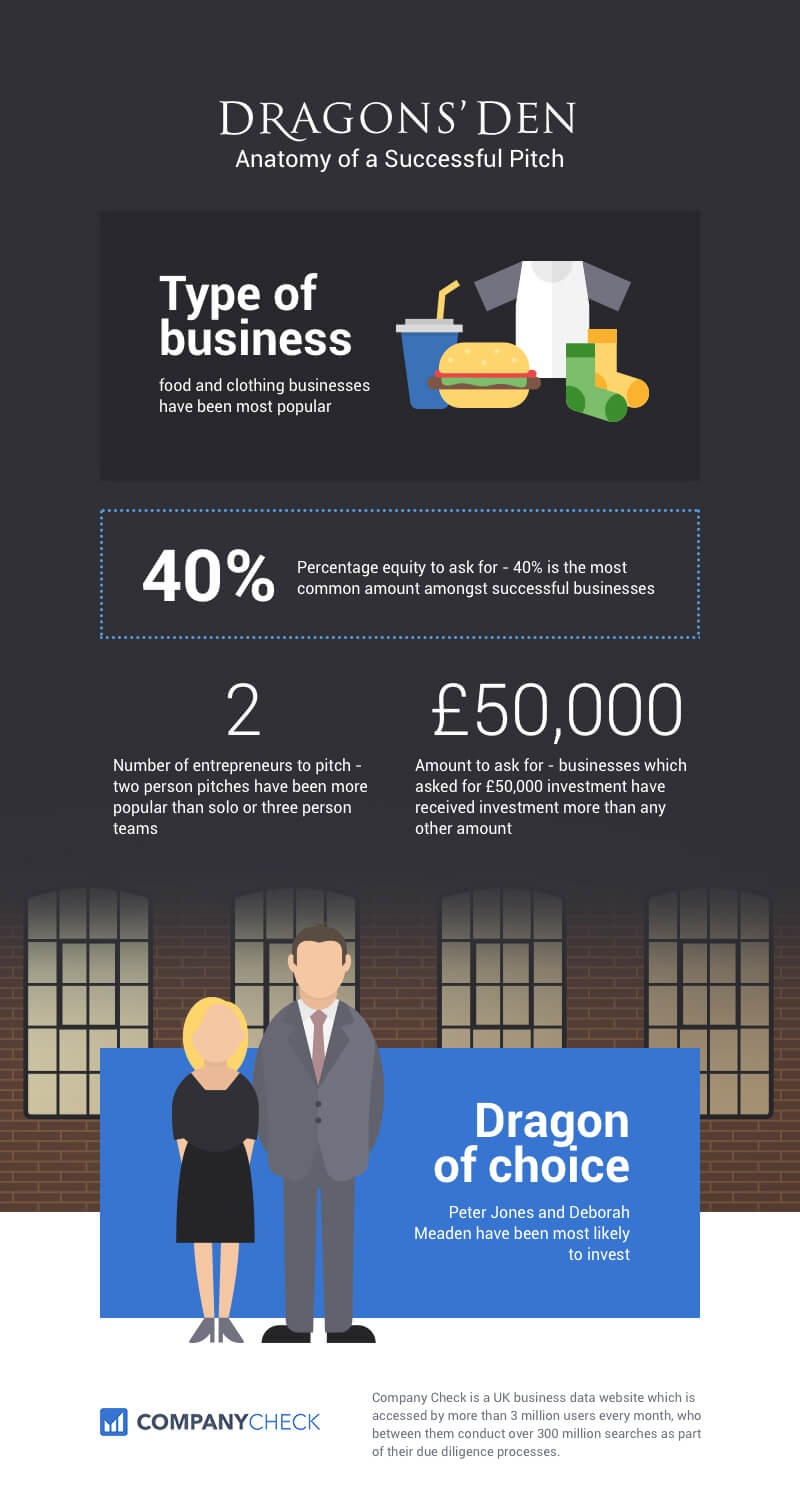Dragons' Den is probably most famous for the pitches that go wrong, but dozens of entrepreneurs have presented well and received investment as a result. Here's how they did it.
Taming The Dragons: Lessons From The Den’s Successes
Dragons' Den is probably most famous for the pitches that go wrong, but dozens of entrepreneurs have presented well and received investment as a result. Here's how they did it.

The Dragons of BBC’s Dragons’ Den are notorious for their ruthless interrogations and blunt criticisms of nervous entrepreneurs. Yet in spite of this, a total of 187 businesses have received offers of thousands of pounds of investment over the show’s 13 series so far.
New research by business data site Company Check has analysed all of those 187 successful pitches to extract common themes and answer the question of what makes for success in the Den.
Their findings give a really interesting look at how the Dragons’ tastes have changed (or not) over the years, with one industry in particular faring better than others when it comes to securing the “I’m in” from the investors. The infographic below shows what they found:
A taste for food businesses
Fans of the show won’t be surprised by the fact that food businesses have received more investment offers than any other industry.
Ever since series 4, when Levi Roots secured investment in his Reggae Reggae Sauce that propelled his company into the public consciousness, food businesses have been popular with the investors.
A total of 17% of all investment have gone to food businesses, something which Jane Milton, food industry expert and consultant to a number of Dragons’ Den food businesses via Deborah Meaden, said:
“The Dragons work with food businesses because they already have experience in this market, they connect to experts in different fields who can offer advice, contacts etc and because you can make real changes, often without major investment.
“Food and drink are fast moving sectors where you can quickly see the effects of changes made. Because the Dragons have great contacts with retailers etc, they can open doors.”
Chika Russell, whose received an offer from Peter Jones to invest in her snack foods company in season 13 (though she turned the offer down after the show), shared her thoughts on why food and drink receives more investment than industries like clothing and tech:
“Food and drink businesses work on Dragons’ Den for a few reasons: first, there are major changes in consumer eating patterns and the large players are just not set up to innovate to meet the demand for new, contemporary food products. Second, the Dragons are inevitably all consumers of food and drink and can immediately have their own view as to whether it can be successful in the market place.”
Know what to ask for
The research also identified other common traits of successful Dragons’ Den pitches.
The data shows that more pitches which offered 40% equity share were successful than any other amount. Entrepreneurs seeking £50,000 investment were also more likely to succeed.
Two person pitches were found to be the most popular - a trend that has continued already into the first episode of series 14.
Speaking about the results of the research, Alastair Campbell, founder of Company Check, who recently announced $1,000,000 investment in his latest venture Carsnip, expressed surprise at the representation of the tech sector in the Den.
He said: “It’s interesting to see the trends that are emerging in the way the Dragons invest over the years. Despite changes in the show’s lineup, there are clearly certain types of business that are more likely to receive investment than others.
“Of course, the Dragons’ backgrounds play a big part in this, as there will be types of companies and industries in which they have more experience and therefore a greater interest. The data shows that technology business investments have not grown over the years, despite the boom in this area elsewhere, which is interesting but also a bit of a chicken and egg situation – if the businesses aren’t pitching, they can’t invest!
“I’ll be following the new series with interest to see if the investment choices differ this time around.”
Looking ahead to series 14
The new series has just started, and there are already some talking points that have come up in light of this research. Of the two companies that received investment, one operates in the food and drink industry - Craft Clubs Ltd. - yet another investment into that industry by Sarah Willingham, who has already had great success with the London Cocktail Club.
Although both companies walked away with more cash and less equity given up than the 13 season average, it is worth noting that the majority of both pitches were carried out by 2 entrepreneurs, which is the most common number needed to be successful in the Den according to the data.
The most recent episode highlights two important lessons that the show teaches entrepreneurs: know your market, and have confidence in your product.
The Dragons struggled to stomach Craft Clubs Ltd.’s ‘ludicrous’ valuation of their business, but John Hulme and John Burke walked away with a £77,000 offer because they had successfully identified a big enough gap in the alcohol market. Had the co-founders not had such a clear idea of what they could achieve in their market, the Dragons may have simply dismissed them out of hand.
The Boot Buddy also came close to being dismissed in the Den, as the Dragons struggled to move past how much money had been pumped into the product already. However, Rashpal and Gurminder Dhillon passionately defended Arminder’s invention, arguing strongly for its versatility and usefulness. Their passion for the product was enough to win over three Dragons, and they left with £60,000.
As the new series unfolds, it will be interesting to see if the trends identified in Company Check’s research hold true, or if change is afoot amongst the Dragons.
Thanks for signing up to Minutehack alerts.
Brilliant editorials heading your way soon.
Okay, Thanks!





